- Home
- Joseph Conrad
The Heart of Darkness and the Secret Sharer
The Heart of Darkness and the Secret Sharer Read online
Table of Contents
Title Page
Copyright Page
Introduction
The Secret Sharer
I
II
Heart of Darkness
I
II
III
Afterword
Selected Bibliography
A native of Poland, Joseph Conrad (1857-1924) spent his youth at sea, and although relatively ignorant of the English language until the age of twenty, he ultimately became one of the greatest of English novelists and stylists. At the age of thirty-two, he decided to try his hand at writing, left the sea, married, and became the father of two sons. Although his work won the admiration of critics, sales were small, and debts and poor health plagued Conrad for many years. He was a nervous, introverted, gloomy man for whom writing was an agony, but he was rich in friends who appreciated his genius, among them Henry James, Stephen Crane, and Ford Madox Ford. Among his best-known works are Almayer’s Folly (1895), The Nigger of the ‘‘Narcissus’’ (1897), Lord Jim (1900), Heart of Darkness (1902), The Secret Agent (1907), Chance (1913), and Victory (1915).
Joyce Carol Oates is the author of numerous novels, as well as collections of stories, poetry, and plays. The Roger S. Berlind Distinguished Professor in the Humanities at Princeton University, she is the recipient of numerous literary awards, including the National Book Award, the PEN-Bernard Malamud Award for the short story, and the Prix Femina.
Vince Passaro is the author of Violence, Nudity, Adult Content: A Novel, as well as criticism, essays, and short fiction that have appeared in many national magazines, including Harper’s, Esquire, GQ, Elle, O The Oprah Magazine, The New York Times Sunday Magazine , Story, Open City, Salon.com, and others. Both his fiction and essays have been widely anthologized, and he has taught literature and creative writing at New York University and Columbia University.
SIGNET CLASSICS
Published by New American Library, a division of
Penguin Group (USA) Inc., 375 Hudson Street,
New York, New York 10014, USA
Penguin Group (Canada), 90 Eglinton Avenue East, Suite 700, Toronto,
Ontario M4P 2Y3, Canada (a division of Pearson Penguin Canada Inc.)
Penguin Books Ltd., 80 Strand, London WC2R 0RL, England
Penguin Ireland, 25 St. Stephen’s Green, Dublin 2,
Ireland (a division of Penguin Books Ltd.)
Penguin Group (Australia), 250 Camberwell Road, Camberwell, Victoria 3124,
Australia (a division of Pearson Australia Group Pty. Ltd.)
Penguin Books India Pvt. Ltd., 11 Community Centre, Panchsheel Park,
New Delhi - 110 017, India
Penguin Group (NZ), 67 Apollo Drive, Rosedale, North Shore 0632,
New Zealand (a division of Pearson New Zealand Ltd.)
Penguin Books (South Africa) (Pty.) Ltd., 24 Sturdee Avenue,
Rosebank, Johannesburg 2196, South Africa
Penguin Books Ltd., Registered Offices:
80 Strand, London WC2R 0RL, England
Published by Signet Classics, an imprint of New American Library,
a division of Penguin Group (USA) Inc.
First Signet Classics Printing, December 1950
First Signet Classics Printing (Passaro Afterword), August 2008
Introduction copyright © The Ontario Review, Inc., 1997
Afterword copyright © Vince Passaro, 2008
All rights reserved
REGISTERED TRADEMARK—MARCA REGISTRADA
The scanning, uploading, and distribution of this book via the Internet or via any other means without the permission of the publisher is illegal and punishable by law. Please purchase only authorized electronic editions, and do not participate in or encourage electronic piracy of copyrighted materials. Your support of the author’s rights is appreciated.
http://us.penguingroup.com
Introduction
My task which I am trying to achieve is, by the power of the written word, to make you hear, to make you feel—it is, before all, to make you see.
—Joseph Conrad, Preface, The Nigger of the ‘‘Narcissus,’’ 1897
Like those other masterworks of the English fin de siècle, Robert Louis Stevenson’s Dr. Jekyll and Mr. Hyde (1886), Oscar Wilde’s The Picture of Dorian Gray (1890-91), and Henry James’s The Turn of the Screw (1898), to which it bears a subtle thematic kinship, Joseph Conrad’s ‘‘Heart of Darkness’’ (1902) is a work of the imagination that has transcended its late-Victorian era to acquire the stature, with the passing of time, of one of the great visionary self-examinations of Western civilization. Based, like most of Conrad’s fiction, upon personal experience, ‘‘Heart of Darkness’’ is a rare Symbolist work with roots in historic authenticity; its theme is nothing less than the acknowledgment of a tragic darkness—the ethic of the ‘‘brute’’—in the heart of late-nineteenth-century Christian-capitalist Europe. Out of his outraged witnessing of what he called ‘‘the vilest scramble for loot that ever disfigured the history of human consciousness’’—the plunder of Africa by Europe—Conrad created a universal parable of man’s fallen nature in the guise of an adventure/mystery tale.
In Dr. Jekyll and Mr. Hyde, Robert Louis Stevenson created a vivid, iconic metaphor for civilized man’s divided nature: there is the ‘‘good’’ if passionless Dr. Jekyll, and there is his suppressed brother self, the stunted, impassioned, ‘‘evil’’ Hyde who dwells within Jekyll and can be released—fatally—by a magic elixir. In Oscar Wilde’s The Picture of Dorian Gray, the seductively beautiful young Dorian commits sins against humanity that are engraved, not on his unblemished, never-aging face, but on the face of his portrait, which has been hidden away: what more striking metaphor for the hypocritical nature of privileged Caucasian bourgeois society? In Henry James’s enigmatic The Turn of the Screw, that most elegantly constructed of ghost stories, the reader is confronted by a seemingly good Christian governess who may herself be the catalyst of the destruction of her young charges: Does this zealous, well-intentioned young woman discover perversity and evil surrounding her, or is she luridly imagining it? Joseph Conrad’s ‘‘Heart of Darkness,’’ though elaborately composed of oscillating images of light and dark, order and chaos, is by far the most realistic of these unusual works of fiction; yet here, too, is a powerful mythic portrait of a ‘‘good’’ man, Kurtz (the chief of the inner station of the trading company, ‘‘an emissary of pity, and science, and progress, and devil knows what else’’), who is simultaneously an ‘‘evil’’ man (a vicious, unscrupulous trader in ivory who ends up tyrannizing African natives, his jungle sanctuary surrounded by the grisly emblems of his madness, the decapitated heads of native ‘‘enemies’’). Kurtz, whom Marlow had sought avidly, risking his own life in a treacherous and foolhardy adventure that comes close to destroying him, is both Dr. Jekyll and Mr. Hyde; the elixir that fatally releases his primitive, evil self is simply distance from home, the freedom of a white man’s power over those whom he considers his racial ‘‘inferiors,’’ whose influence over him is subliminal and unacknowledged:I tried to break the spell [Marlow says]—the heavy, mute spell of the wilderness—that seemed to draw him to its pitiless breast by the awakening of forgotten and brutal instincts, by the memory of gratified and monstrous passions. This alone, I was convinced, had driven him out to the edge of the forest, to the bush, towards the gleam of fires, the throb of drums, the drone of weird incantations. . . . There was nothing either above or below him, and I knew it. He had kicked himself loose of the earth. . . . [H]is soul was mad. Being alone in the wilderness, it had looked within itself, and, by heavens! I tell y
ou, it had gone mad.
It is Marlow’s compelling argument, and through Marlow, Conrad’s, that the mind of man is capable of anything ‘‘because everything is in it, all the past as well as all the future.’’ Marlow’s (and Conrad’s) journey up the Congo is, in one sense, a journey back into time: beginning with Marlow’s apprehension that England, too, was once ‘‘one of the dark places of the earth’’ and moving to a consideration of the ‘‘fascination of the abomination’’—the fascination of civilized man for his primitive, atavistic roots. What romance there is in Conrad’s prose, in his celebration of such truths: ‘‘The voice of the surf heard now and then was a positive pleasure, like the speech of a brother.’’ And in the memorable passage in which Marlow describes his excitement at setting out, at last, to meet the mysterious chief of the inner station, Kurtz:Going up that river was like travelling back to the earliest beginnings of the world, when vegetation rioted on the earth and the big trees were kings. An empty stream, a great silence, an impenetrable forest. The air was warm, thick, heavy, sluggish. There was no joy in the brilliance of sunshine. . . . [Y]ou lost your way on that river as you would in a desert . . . till you thought yourself bewitched and cut off for ever from everything you had known once—somewhere—far away—in another existence perhaps.
The anxieties aroused by Charles Darwin’s controversial, bitterly contested theory of evolution by way of natural selection, first promulgated in Origin of Species (1859) and subsequently in The Descent of Man (1871) are given tragic dramatic form in the tale of Kurtz’s deterioration in the jungle, the much-acclaimed Kurtz of whom it is said by Marlow that ‘‘all of Europe had gone into [his] making.’’ Conrad’s irony is a constant throughout the narrative, like a haunting vibration beyond the sounds of words normally uttered. And what intransigent irony in Kurtz’s final words, as if Shakespeare’s unregenerate Edmund, or Iago, and not Lear or Othello, were the touchstones of moral truth. Dying of fever in the jungle, as Marlow nearly dies, Kurtz’s famous pronouncement of his own spiritual condition— ‘‘The horror! The horror!’’—is a judgment upon man’s universal propensity for evil. What is this mysterious kinship that Marlow feels with the doomed man, whom he has traveled hundreds of miles to meet, only to discover him moribund, hideous? ‘‘It was as if an animated image of death carved out of old ivory had been shaking its hand with menaces at a motionless crowd of men made of dark and glittering bronze.’’ (Compare Marlow’s subterranean connection with Kurtz to the idealized and romanticized connection between the immature young captain of ‘‘The Secret Sharer’’ and his double, the fugitive Leggatt.) Yet, in his symbolic role as chief of the coveted inner station, Kurtz is indeed, as Marlow claims, a remarkable man:[H]is stare . . . was wide enough to embrace the whole universe, piercing enough to penetrate all the hearts that beat in the darkness. He had summed up—he had judged. ‘‘The horror!’’ . . . It was an affirmation, a moral victory paid for by innumerable defeats, by abominable terrors, by abominable satisfactions. But it was a victory! That is why I have remained loyal to Kurtz to the last. . .
(Kurtz’s real-life model was a man named Georges Antoine Klein, an employee of the Brussels-based trading company Société Anonyme Belge pour le Commerce du Haut-Congo, whom Conrad met shortly before Klein’s death. His body was buried at Tchumbiri on the Congo.)
Through the prism of shimmering, musical language that is the essence of Conrad’s achievement in ‘‘Heart of Darkness,’’ the author has hoped to elevate Kurtz, a white racist murderer whose actions have parodied the idealism of his speech, to the stature of tragedy; he is one whose degradation at the end of his life can’t be the sole measure of his moral worth.
Like Herman Melville, who also went to sea as a very young man, Joseph Conrad acquired in his early, impressionistic years a rich store of material to be transformed into tales and novels of exoticism, danger, and rites of passage. Born Józef Teodor Konrad Korzeniowski at Berdyczow in Podolia, Poland, on December 3, 1857, Conrad lost his parents at a young age, attended school in Cracow, and first went to sea, on a French merchant marine vessel, at the age of seventeen. He is said to have attempted suicide at the age of twenty-one, but recovered quickly and signed on with the British merchant navy for whom he would serve, at various ranks, for the next sixteen years. He became a naturalized British subject in 1886 and changed his name to Joseph Conrad; in that year he wrote his first short story, ‘‘The Black Mate.’’ His numerous voyages took him virtually everywhere—to the West Indies, to Constantinople, to Sumatra, India, Java, Australia, Singapore; most famously, and almost fatally, to the Belgian Congo in 1890. Though desperate to earn a living, the youthful Conrad was clearly a romantic for whom sailing was an emotional, perhaps even a spiritual vocation. Surely this is Conrad speaking in the voice of Marlow, confiding in his fellow seafarers at the outset of ‘‘Heart of Darkness’’:Now when I was a little chap I had a passion for maps. I would look for hours at South America, or Africa, or Australia, and lose myself in all the glories of exploration. At that time there were many blank spaces on the earth, and when I saw one that looked particularly inviting on a map (but they all look that) I would put my finger on it and say, ‘‘When I grow up I will go there.’’
By the time Marlow had grown up, however, Africa had ‘‘ceased to be a blank space of delightful mystery. . . . It had become a place of darkness. But there was in it one river especially . . . resembling an immense snake uncoiled, with its head in the sea, its body at rest curving afar over a vast country, and its tail lost in the depths of the land.’’ This great river, the Congo, fascinates Marlow ‘‘as a snake would a bird.’’
In June 1890, Conrad was appointed captain of a river steamer on the Congo; ominously, his predecessor had been butchered by native Africans and his body left to rot unburied in the jungle. Conrad’s difficult four-mouth adventure, recorded more or less faithfully in ‘‘Heart of Darkness,’’ left him near death, devastated with dysentery and fever; his health was broken for the remainder of his life. Conrad’s predilection for extreme pessimism, depression, and anxiety would seem to have been exacerbated by his physical condition. In May 1891, for instance, following his return in Europe, he confided in a letter to a friend, ‘‘I am still plunged in deepest night, and my dreams are only nightmares.’’ (See Conrad by Norman Sherry, Thames & Hudson, 1972.)
Yet the experience was transforming to Conrad, comparable to the experience of writers who have seen armed combat firsthand or have been wounded in battle, for Conrad would one day claim that ‘‘before the Congo, I was just an animal.’’ By the end of 1894, Conrad had retired from seafaring; his first novel, Almayer’s Folly, was published and well received in 1895. His remarkable career had begun.
Though always a controversial figure, criticized in some quarters for his intensely poetic, frequently rhetorical prose and for the unremitting pessimism of certain of his works, Conrad is generally acclaimed as one of the progenitors, along with his mentors Gustave Flaubert and Henry James, of the Modernist novel; he has been called a master of the psychological novel, the political novel, and the ‘‘intellectual mystery’’ novel; the fastidiously rendered prose of such works as The Nigger of the ‘‘Narcissus,’’ ‘‘Heart of Darkness’’ and Nostromo, among others, identifies him as a writer for whom language is a kind of music, rendered with a poet’s ear. Following Henry James’s example in his essay ‘‘The Art of Fiction’’ (1888), Conrad set out, in his Preface to The Nigger of the ‘‘Narcissus’’ (1897), to establish his belief in the alliance in prose fiction of the moral and the aesthetic; his elevation of the writing life is extreme, suggesting almost a religious, or mystical, vocation; the artist is one who snatches ‘‘in a moment of courage . . . a passing phase of life’’ in the effort of showing life’s ‘‘vibration, its color, its form; and through its movement, its form, and its color, reveal[s] the substance of its truth.’’
By the time of Conrad’s death in 1924, in Canterbury, England, this Polish-bo
rn emigrant for whom English was not his first or even his second language, would be celebrated as one of the greatest of English novelists, revered as a classic in his own time.
Since its initial publication in 1902, in the volume Youth, Conrad’s most meticulously poetic work of fiction, ‘‘Heart of Darkness,’’ has acquired an extraordinary reputation. Nine decades after its publication it remains one of the most read, and debated, of English works of fiction; it was the model, in spirit, of the flawed but enormously ambitious film by Francis Ford Coppola, Apocalypse Now1 (1979); it has easily become the surpassing masterwork of Conrad’s distinguished career, displacing even The Nigger of the ‘‘Narcissus,’’ Lord Jim (1900), Nostromo (1904), The Secret Agent (1907), Victory (1915), and such brilliantly realized tales as ‘‘The Secret Sharer’’ and ‘‘An Outpost of Progress.’’ Part of this is due, of course, to the novella’s brevity; like Henry James’s The Turn of the Screw, it is a feat of dramatic compression in which virtually every passage, if not every sentence, moves us ineluctably toward our moment of revelation: the unmasking of Kurtz, and his twin, terrible pronouncements, ‘‘Exterminate all the brutes!’’ and ‘‘The horror! The horror!’’ (The latter has achieved a kind of transcultural autonomy, very like Edvard Munch’s 1895 woodcut ‘‘The Scream’’—a bleakly comic shorthand for twentieth-century angst.)
Unlike other, longer works of Conrad’s that provide the reader with imbricated layers of exposition, history, psychology, and description, ‘‘Heart of Darkness’’ moves swiftly forward as Marlow’s journey moves him, by starts and stops, forward; this is an adventure/mystery story set in the most exotic of locales and fueled by a nightmare logic. The reader is meant to replicate Marlow’s voyage as he journeys up the Congo in a snakelike passage into the depths of a formerly blank, unmapped territory: the human soul.

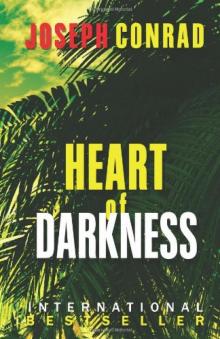 Heart of Darkness
Heart of Darkness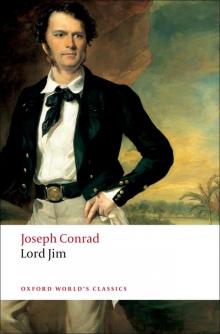 Lord Jim
Lord Jim The Nigger of the Narcissus (Echo Library)
The Nigger of the Narcissus (Echo Library)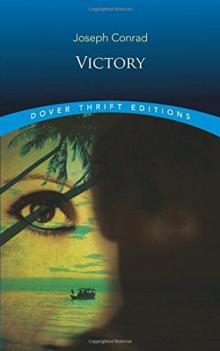 Victory (Dover Thrift Editions)
Victory (Dover Thrift Editions) Secret Agent
Secret Agent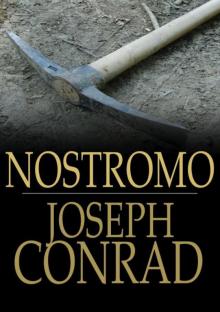 Nostromo
Nostromo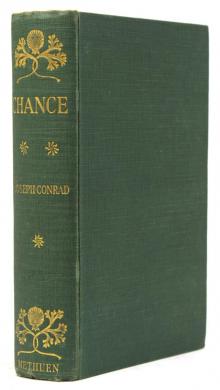 Chance: A Tale in Two Parts
Chance: A Tale in Two Parts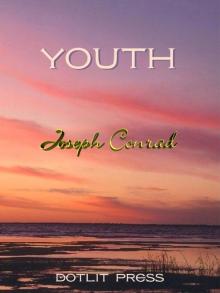 Youth
Youth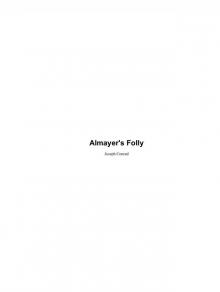 Almayer's Folly
Almayer's Folly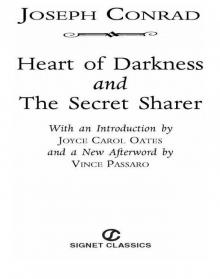 The Heart of Darkness and the Secret Sharer
The Heart of Darkness and the Secret Sharer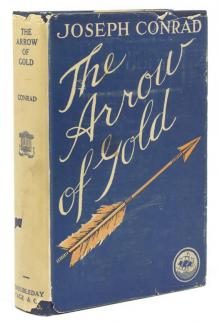 The Arrow of Gold: A Story Between Two Notes
The Arrow of Gold: A Story Between Two Notes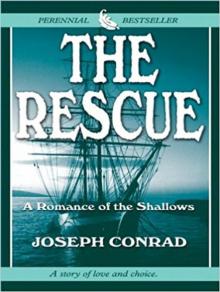 The Rescue: A Romance of the Shallows
The Rescue: A Romance of the Shallows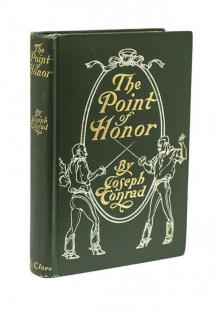 The Point Of Honor: A Military Tale
The Point Of Honor: A Military Tale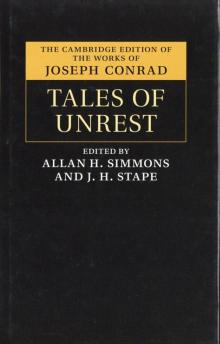 Tales of Unrest
Tales of Unrest Under Western Eyes
Under Western Eyes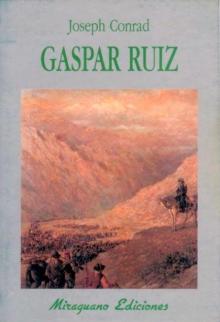 Gaspar Ruiz
Gaspar Ruiz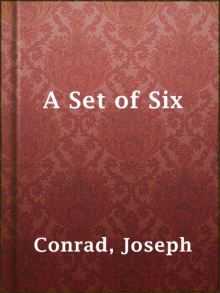 A Set of Six
A Set of Six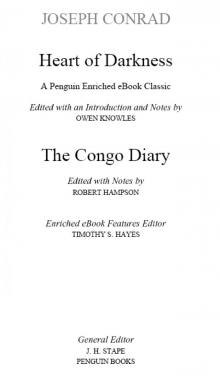 Heart of Darkness and the Congo Diary (Penguin Classics)
Heart of Darkness and the Congo Diary (Penguin Classics)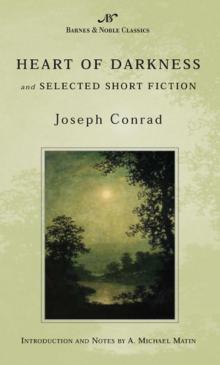 Heart of Darkness and Selected Short Fiction
Heart of Darkness and Selected Short Fiction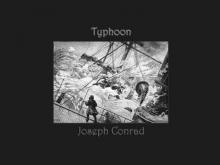 Typhoon
Typhoon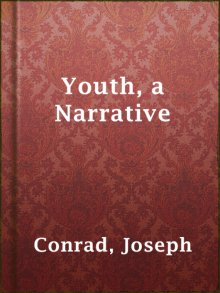 Youth, a Narrative
Youth, a Narrative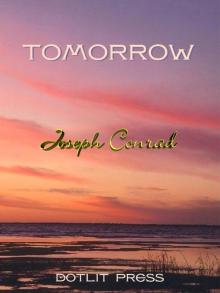 Tomorrow
Tomorrow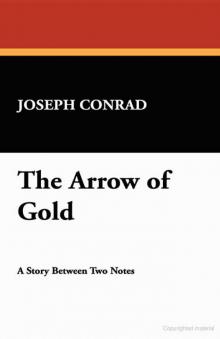 The Arrow of Gold
The Arrow of Gold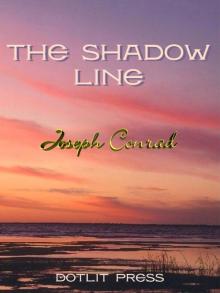 The Shadow Line: A Confession
The Shadow Line: A Confession The Rescue
The Rescue Victory (Echo Library)
Victory (Echo Library) The Brute
The Brute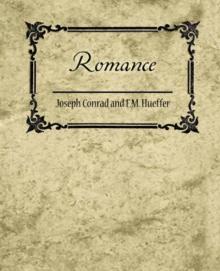 Romance
Romance A Personal Record
A Personal Record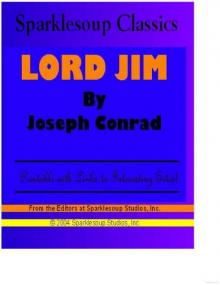 Lord Jim: A Tale
Lord Jim: A Tale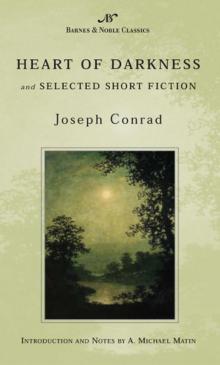 Heart of Darkness and Selected Short Fiction (Barnes & Noble Classics Series)
Heart of Darkness and Selected Short Fiction (Barnes & Noble Classics Series)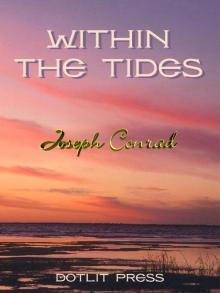 Within the Tides
Within the Tides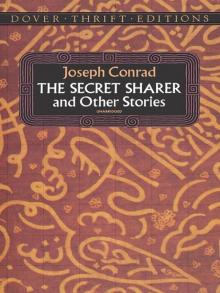 The Secret Sharer and Other Stories
The Secret Sharer and Other Stories Falk
Falk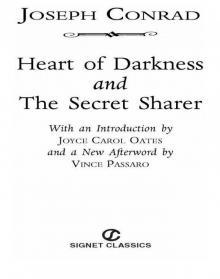 Heart of Darkness and The Secret Sharer
Heart of Darkness and The Secret Sharer Chance
Chance An Anarchist
An Anarchist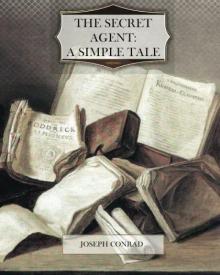 The Secret Agent: A Simple Tale
The Secret Agent: A Simple Tale The Secret Agent
The Secret Agent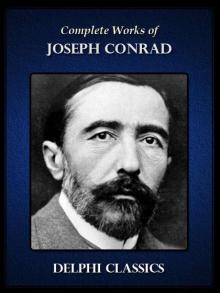 Complete Works of Joseph Conrad (Illustrated)
Complete Works of Joseph Conrad (Illustrated)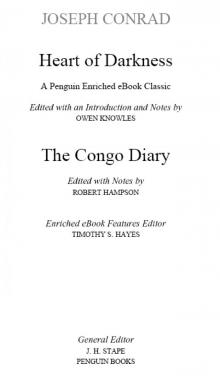 Heart of Darkness and the Congo Diary
Heart of Darkness and the Congo Diary Notes on Life & Letters
Notes on Life & Letters Typhoon (Single Story)
Typhoon (Single Story)